Danny Dorling's Blog, page 29
May 3, 2018
Britain is a Segregated Society – the isolation of the richest from the rest
Britain is a highly segregated society. It boasts the widest Gini coefficient of all the OECD countries in Europe when income inequality is considered. It is home to the most socially segregated system of education in Europe. No other European country has such a high proportion of children being privately educated in a way in which the spending on their education is so much higher than that spent on the other 93% of children, without palpable national benefit.
At the other end of life, in our old age, Britain boasts both some of the widest health inequalities in Europe and also some of the lowest expectations of length of life. We live in a highly divided society and this should be an issue of great concern, not least because it makes us more stupid and less healthy in aggregate, detrimentally affecting even those at the very top.
Perhaps to help illustrate the detrimental effects of living with great segregation the Prime Minister, Theresa May, makes a series of simple geographical mistakes in her foreword to the Green Paper. In her first paragraph she refers to the four countries of the United Kingdom as one country – failing to acknowledge the devolved administrations and differing approaches of other people from other parts of the Kingdom.
Mrs May is part of a very small segment of society, especially isolated from others in British society, and her words reflect this. In the same short paragraph she condescendingly, and with a flourish of megalomania, promises that she herself will ‘build a country that works for everyone … in which everyone, whatever their background, can go as far as their hard work will take them’. In future, phrases such as this will be looked back at as being very telling of her and her governments’ thinking and beliefs. She follows a politics that is itself a product of great social segregation. Few other European countries have a major political party as far to the right as the Conservatives are. In the European Parliament the Conservatives were forced to align themselves with groups such as the Polish ‘Law and Justice’ party; because they had so little in common with other European Conservatives.
Contemporary British Conservative politicians often grow up on the fiction that when people ‘get ahead’ it is because their ‘hard work’ got them there. However, if these politicians, when young, had worked harder and overcome their prejudices they may not have made so many simple mistakes later in life. But it is very difficult to learn to treat people well when you do not grow up with them. In 2013 even Nigel Farage criticized Theresa May’s ‘go home’ vans of operation ‘Vaken’. When, in her second paragraph, Theresa May suggested that ‘Britain is one of the world’s most successful multi-ethnic, multi-faith societies’, the actions of her own Home Office prove that not to have been the case.
In her third paragraph (on page 7 of the Green Paper) the Prime Minster claimed that her government’s recent Race Disparity Audit had been ‘ground-breaking’. It was not. Geographers have explained that it ‘meant little’ because it showed so little understanding of geography. Mrs May said it would help address the inequalities that ‘prevent us from building a Britain where everyone has the chance to succeed.’ Note again, the implication being that individuals should be given ‘chances’. The language will be familiar to children who have read the ‘Hunger Games’ books, where all children are given ‘a chance’.
In her fourth paragraph of introduction to the March 2018 Green Paper the Prime Minister said that the reason to confront segregation is because it ‘undermines our unity as a nation’. She is obsessed with the idea of Britain as a nation, a single country, her country. She and her government also have a tendency to talk of everyone as being like them and so use the word, ‘our’. Recently Jan-Werner Müller identified such language us as being typical of populist politicians who try to claim that they are representative of everyone, of the 100%, as Mr Trump and Mrs May do.
In her fifth paragraph the Prime Minster claimed that the Green Paper will ‘tackle the root causes of a lack of integration – including a lack of social mixing in some of our neighbourhoods and schools, unemployment and poor English language skills.’ These are part of the reason some people are less integrated into society than others, but not in the way Mrs May means. For instance, while she was growing up she did not go to the same schools as most other children in Oxfordshire, and many (if not most) of the young adults she met at university went to segregated private schools. But she will not see her isolation, and the isolation of people like her, as being one of the worst forms of a lack of social mixing in Britain, as compared to other countries in the world where such social isolation is far less common. This is basic geographical knowledge. But she does not have that knowledge.
It is not Mrs May’s fault that she does not understand Britain. She was almost certainly never taught human geography well at her school or university and her advisors now are misinforming her still. She did not benefit from going to school where the most common language after English was Urdu. She did not go to a school with a wide cross section of society. She did not grow up in a diverse neighbourhood. She did not make friends later from a wide cross section. Why should we expect her to have integrated well?
However, even having benefitted from a more inclusive upbringing is no guarantee of better understanding. In his forward to the Green Paper the relevant Secretary of State, Mr Sajid Javid, reminisces over translating for his mother in the doctor’s surgery at the age of six. He talks of ‘shared rights, responsibilities and opportunities.’ But as Tony Blair before him also failed to understand, this phrase about ‘rights and responsibilities’ came from R. H. Tawney and originally meant so much more.
It was Tawney who best described the rights of the poor and the responsibilities of the rich. Tony Blair turned the phrase on its head. Mr Blair was also a product of private education. The Green Paper (page 64) proposes a new national survey to ascertain the extent to which people are aware of their ‘shared/common rights and responsibilities’. Perhaps the origins of the phrase need to be better studied by those preparing the survey. The entire ‘Measuring Success’ section of the green paper is risible.
The Green Paper (page 11) begins with an assertion that: ‘As of January 2017, 60% of minority ethnic pupils were in schools where minority ethnic pupils are in the majority.’ In other words, in diverse areas there are diverse schools. In great contrast, the proportion of the children of the richest 5% who are educated where children of the richest 5% are in a majority is, of course, far higher than 60%. And in contrast to mixing by ethnicity in schools, which is increasing over time, there is no evidence that the rich are mixing more.
Similarly, the very rich are extremely geographically isolated living mostly in a small number of neighbourhoods and being part of a declining group of people who can afford to buy their homes outright without a mortgage.
The Green Paper is concerned that 770,000 people, just over 1% of the population, say they cannot speak English well, but makes no mention of the inability of most people to speak a second language, or of Welsh, Gaelic, or Irish.
On page 12 the Green Paper explained: ‘Low levels of meaningful contact between people from different backgrounds can increase levels of mistrust and anxiety, damaging people’s health and well-being and limiting their ability to make the most of the opportunities Britain offers. Negative cultural norms can take hold, including prejudice, anti-social behaviour and oppression of women.
This is all true. We are a divided society because the wrong people are today in power; selfish, individualistic, nasty people from ‘the nasty party’ as Theresa May herself once called it. Until a government not sponsored by the rich and made up almost exclusively of the rich is in power we should not expect progress.
Read more, other chapters in this publication and access the PDF of this chapter
Mortality rates in the London Borough of Kensington (all deaths 2011-2014)
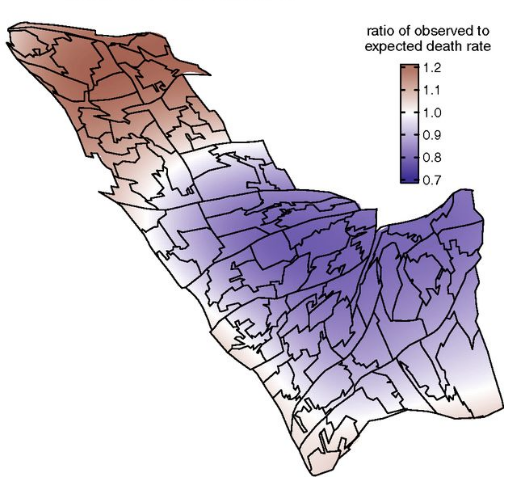
Mortality rates in the
London Borough of
Kensington (all deaths
2011-2014)
Source: Michael T. Gastner, Vivien Seguy, and Pratyush More (2018) Fast flow-based algorithm forcreating density-equalizing map projections, PNAS: Proceedings of the National Academy of Sciences of the United States of America, first published on-line on February 20th 2018: Public Library of Science
May 1, 2018
Thank God for the House of Windsor (our museum future)
I used to be a Republican, but that was before Brexit. What does Britain have that the other countries of Europe will still want access to after we leave the EU? Banking will be safer away from ‘offshore London’. There are other places in the world besides Sellafield that can store spent nuclear fuel. The most expensive higher education in the world is unlikely to attract so many overseas students, its lure and decline mirroring that of Swiss finishing schools after their 1980s heyday.
Despite the entrepreneurial myths we tell ourselves, innovation isn’t a British forte. A vacuum cleaner once constructed in Malmesbury is a fitting emblem for the land of hope and glory, if not for the reasons its inventor would have us believe. When Dyson moved production to Malaysia, few British jobs were lost, because so few had been created in the first place.
As the pound drops and the world’s middle class grows in size, tourism is our best bet to tide us over until we learn to do something useful. And the royal family is by far our most potentially profitable export earner. The town of Windsor is already booked out for the summer through Airbnb. American TV companies have reportedly paid six figure sums to book prime sites from which to film the royal wedding on 19 May. The birth of Prince Louis on St George’s Day conveniently supplanted less happy news in the headlines.
The great skills of the British, historically, haven’t been engineering and industry but exploitation and imperialism. We built our tourist attractions up around ancient stone circles, small monastic universities, old London streets and the birthplace of a playwright, but without the British Empire they wouldn’t draw such vast crowds from around the world.
The golden square of English tourism has its corners in London, Stonehenge, Stratford-upon-Avon and Cambridge; at its heart is Oxford (a.k.a. Bicester Village), a short train ride from both Windsor and Buckingham Palace. Everyone in the world with money has to travel here once in their lifetime. They are the Meccas and Medinas for unbelievers – the places to go to give thanks for the fact that you own a plastics factory in Changchun or a software firm in Bangalore.
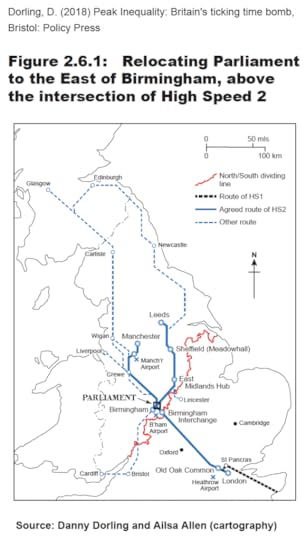
Relocating Parliament
to the East of Birmingham, above the intersection of High Speed 2
Some 2640 ‘commoners’ are to be invited to the royal wedding with surprise golden tickets being awarded to schoolchildren at the nomination of regional lord lieutenants. Unlike Charlie in Roald Dahl’s novel, however, none of them will be given a chocolate factory at the end of their day’s holiday from poverty. In 2018, for the first time in many decades, there are entire local authority districts where a majority of children are growing up in poverty.
It is time to forget any selfish republican fantasies. Forget climate change and pollution: our desperate economic plight means that we have to build that third runway at Heathrow for more tourists to land. We need to embrace our museum future. We are very good at selling the myth that all industry was invented in Britain, that England is the mother of parliaments, that we invented the modern university. We have fooled ourselves into believing it all, so it should be easy to sell to tourists.
Time to widen the pavements and get out the bunting. Build the hotels and face down the nimbys. Bring back red telephone boxes: they don’t need phones in them, just tourist information screens pointing the customer in the right direction.
If we work hard enough, we will win the global race to become the central tourist destination on planet earth. We are in the right time zone; we speak the right language, and no other languages; we have a captive, cheap, docile, servile labour force. We have a quaint currency with a picture of a member of the royal family on it, a souvenir in itself. And every year tourists will get more and more pounds for their dollar, euro, renminbi or rupee.
No one can take our history away from us. Just as millions flock to Rome to see the Colosseum, that site of mass murder, so we could rebuild the East India Company headquarters on Leadenhall Street. Lloyds will have abandoned the premises by then, and moved to Amsterdam. Parliament will have to vacate the palace of Westminster for good. We already have a new site for it: where HS2 will divide, just east of Birmingham.
All empires crumble and an afterlife as a tourist attraction is far better than what befell the Ottomans in the 1920s. The worst casualties may be the youngest members of the British royal family, born into a form of slavery from which they can never escape. But perhaps, in many decades to come, when we have finally learnt to do something useful, their children or grandchildren will not face a future of forever having to smile and wave – simply because of an accident of birth or marriage, and because they are the best that we have to sell to the world.
originally published on the LRB blog: 27th April 2018
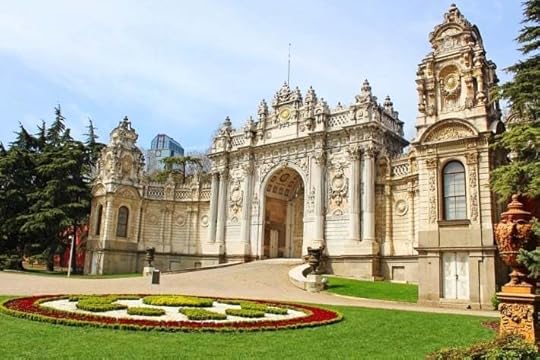
Dolmabace Palace In Istanbul – “Nerve Centre Of The Ottoman Empire”
April 30, 2018
Danny Dorling: Speaking for the motion: This House Would End University Tuition Fees
The current system of university student funding in England is a confidence trick. It is an attempt to defraud a group of people – poorer students and their families – after having gained their trust by pretending that the system is fair and they will be treated equally. Confidence tricks work by exploiting human traits such as naivety and compassion.
Prospective students are told that it is only fair that they take out a loan to fund their studies at university because otherwise poorer people who do not go to university will, in some way, lose out. They are told that they will on average earn so much more than these people in the future that it is only right that they take out a loan.
A desire for inequality?
These arguments are based on untruths and a desire among some, latent or otherwise, for our future society to be even more unequal. Already the UK has the widest income inequality of any European country other than Lithuania. The Gini coefficient of income inequality, as measured by the OECD, is higher in the UK than it is in Israel, and only just a little lower than that of Russia. It is highly unequal countries, such as the USA and Chile, that tend to introduce the most costly and unfair student loan systems. Chile is also the only OECD country to spend more as a proportion of all secondary spending on private schools, than does the UK.
The only way the current student loans system in England can be justified is if we want the UK to continue being ‘the large country with the widest income inequalities in Europe’ for many decades to come. There is a small minority of English people who do think this is a good idea, but most don’t. For instance, 72% of people in Britain support measures such as maximum salaries for those within the top 1% of earners, 70% support higher top income tax rates, and 62% support a wealth tax on very expensive properties.
We have known that loans are unjust for some time. Even before 2012 when university fees were tripled in size:
‘…debt is unequally distributed. Students who are poor before going to university are more likely to be in debt and to leave university with the largest debts, while better-off students are less likely to have debts and leave with the lowest debts. In 2003, students whose parental annual income was less than £20,480 owed an average of £9,708, and half owed more than £10,392. Students with parental incomes over £30,502 owed just £6,806. So on graduation, the poorest students were 43 per cent more in debt than the richest.’
Students studying at university in France, Germany, Italy and Austria pay just a few hundred Euros a year in fees. In Scotland and Scandinavia they pay no fees at all. In Germany far more students go to university than in the UK.
Listen to the proposition here (at the end of the debate the students were perfectly evenly split in their voting, for and against supporting the motion):
April 21, 2018
Could 2018 be the peak of the crisis in health in the UK or will 2019 be even worse?
Since 2011, something unusual and, in modern British history, unprecedented has happened to life expectancy: it has flatlined.
Louise Haigh, Labour Member of Parliament for Sheffield, Heeley Constituency, speaking in Westminster Hall, April 18th 2018, (Hansard Volume 639 Column 177WH):
“For the first time in well over a century, the health of the people of this nation has stopped improving. It is of course axiomatic that life expectancy cannot increase forever, and that a slowdown in growth would eventually occur, but it is the sudden and sustained rise in mortality rates that has so concerned public health professionals and should concern us as parliamentarians.
The period from July 2014 to June 2015 saw an additional 39,074 deaths in England and Wales, compared with the same period the previous year. While mortality rates fluctuate year on year, that was the largest rise for nearly 50 years, and the higher rate of mortality was maintained throughout 2016 and into 2017. Provisional figures on the number of weekly deaths indicate that winter mortality was higher than usual in early 2015, 2017 and 2018.
Those recent trends contrast starkly with the long-term decline in age-specific mortality rates throughout the 20th and 21st centuries. Now, research published in The BMJ has revealed the shocking fact that 10,000 more people died in the first seven weeks of 2018 than in the same period in 2017. The study finds no external factor that might have caused the 11% rise: no unusual cold snap, natural disaster or flu outbreak outside normal expectations. The Office for National Statistics has gone so far as to revise down its official life expectancy projections by almost a whole year, compared with the projections of just two years ago. That means 1 million further earlier deaths are now projected over the next 40 years.
The Financial Times has reported that the deceleration of previous rises in life expectancy has cut £310 billion from future British pension fund liabilities. …
How then to explain an increase of 40,000 deaths on what was projected for this year, and an extra 25,000 deaths for next year? We can only conclude that there has been a sharp deterioration in the collective health of this country. Dominic Harrison, Director of Public Health for Blackburn and Darwen, and an adviser to Public Health England, has said that the figures are a “strong and flashing” amber light … something is making the population more vulnerable to avoidable death.”
…
Robert Courts, Conservative Member of Parliament for Oxfordshire, Witney:
The hon. Lady will not be surprised to hear that I do not agree with her. She made a number of points, but I am simply suggesting that the issue is complex. Saying simply that necessary control of public spending leads to an increase in mortality, as is being suggested, is too simplistic. … I am glad that the hon. Member for Sheffield, Heeley has accepted that life expectancy cannot be expected to increase forever. That is of course common sense and a point that she readily accepts, but the point bears repeating and remembering.”
Could 2018 be the peak of the crisis in health in the UK? or will 2019 be even worse – Life expectancy has stalled, infant mortality is rising, no other European country is as badly effected. Danny Dorling speaking at ‘Medicine Unboxed’ in Cheltenham on November 25th 2017.
April 17, 2018
Rule Britannia and Stupidity,
A 15 minute talk on the Brexit Referendum of 2016, Rule Britannia in 2017, and stupidity in 2018, given by Danny Dorling at St Georges, Bristol, as part of a 5×15 event, April 16th 2018.
Rule Britannia & Stupidity

St Georges, Bristol, a 5×15 event, April 16th 2018.
On Wednesday 22nd June 2016 I was cordially invited to a Garden Party in celebration of 20 years of publishing at Policy Press, what is now part of the University of Bristol Press, for ‘Drinks and Canapés’ at The Orangery, Goldney Hall, University of Bristol, Lower Clifton Hill, Bristol BS8 1BH’.
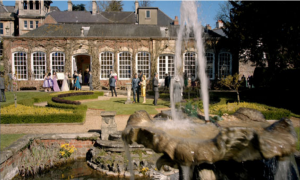
The Orangery, Goldney Hall, University of Bristol, Lower Clifton Hill, Bristol BS8 1BH’
All was well with the world.
On the morning of Thursday June 23rd 2016 I stumbled out of my friend George’s house on Brandon Hill in Bristol, in the heart of liberal/labour/radical/affluent Britain – nursing a severe hangover.
I walked down Anchor Road; across Pero’s Bridge – the bridge named after Pero Jones, the 18th century slave of Bristol Merchant John Pinney, who lived at five Great George Street: next door to where we are now.
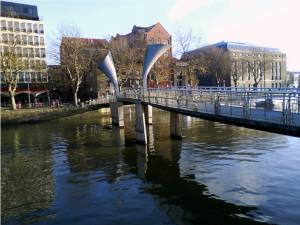
Pero’s Bridge – the bridge named after Pero Jones
How far we had come, I thought, that we can now name footbridges after slaves and recognise our past. Maybe one day they won’t call Colston Hall after that slave-trader any more – , and Massive Attack will finally play the venue (no that was wishful thinking!).

Massive Attack, who would never play at Colston Hall
I stumbled across the bridge feeling pleased with myself despite the headache, and walked into Queen’s Square. It was a beautiful morning.
A man on a bicycle caught my eye. He was cycling around and around the square with a megaphone in his hand, shouting “Vote Remain”. The EU flag fluttering behind him. Oh yes, it’s the referendum I thought. Must remember to vote.
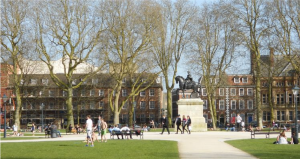
Queen’s Square Bristol
I caught my train in time to get to Oxford for lunch in college – it being important not to miss anything that looks like, and is, a free meal.
The talk around the high table was of the spread-betting. Remain were clearly going to win. All the pundits thought so. More importantly the ‘markets’ thought so, and the markets were never wrong. People laying down their actual dollars rather than simply voicing their opinions, had so much more to lose.
We had a sweepstake in the college; of what both the turnout and vote might be. The consensus was clearly that Remain would win, it was just a question of by how much and with what volume.
The BBC’s Andrew Marr had been at the college a few weeks earlier, explaining that Cameron would have to resign if he lost, but Andrew did not countenance such a loss.

Andrew Marr
We were informed, we were connected, we were unanimous. From the most revolutionary of Trotskyists, to the trendy anarchists, to the Corbyn Labour and old-new Labour, to the Liberals, to the more mild-mannered, the one-nation, or even the obviously swivel eyed Tories. Everyone I met in those days – we were all unanimous. Across the broad church of my social circles we were as one.
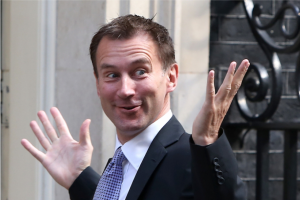
Jeremy Hunt
Across the geographies I travelled Bristol (clifton), Oxford (central), London (elite), we were single-minded. I only heard dissenting voices in the minority, only occasionally and mostly hushed.

Canal House, St Peter’s, Oxford
I went and voted. I assumed I was wasting my time and it was a forgone conclusion; but I quite enjoy voting. And then I went to the college summer garden party, drank prosecco and joked over what might happen if it went ‘the wrong way’.
One of the trillions of repercussions is that, almost two years later, I’m back in Bristol reading you the words of ‘Rule Britannia’:
When Britain first, at heaven’s command,
Arose from out the azure main,
This was the charter of the land,
And Guardian Angels sang this strain.
The nations not so blest as thee
Must, in their turn, to tyrants fall,
While thou shalt flourish great and free:
The dread and envy of them all.
Still more majestic shalt thou rise,
More dreadful from each foreign stroke,
As the loud blast that tears the skies
Serves but to root thy native oak.
Rule, Britannia! Britannia, rule the waves!
Britons never, never, never shall be slaves.
— xxx —
Rule Britannia was originally a poem, set to music by Thomas Arne in 1740. The poem was written by the Scottish playwright James Thomson, who was subsequently given a pension of £100 a year by the then Prince of Wales in return for demonstrating such patriotism and skill at early propaganda.
The Prince of Wales in 1740 was Frederick Ludwig of Brunswick-Lüneburg, a grandson of George the elector of Hanover. Frederick had been born in Germany in 1707 when ‘Great Britain’ was only newly being created. He did not step foot in England until 1728. He died aged 44 in 1751, not speaking [much] English.

Prince of Wales Frederick Ludwig of Brunswick-Lüneburg
The newly christened British began founding colonies and setting up trading posts. In the West Indies they vastly expanded the infamous global slave trade. Their ‘East India Company’ began the looting of India, and exporting opium and addiction to China.
The early Empire appeared to begin to fall apart when those colonists that the English thought were just ‘a rabble of farmers’ in the thirteen American colonies defeated the British army and won their war for independence in the early 1780s.
But instead of falling apart, for well over a century Britain flourished great and free:
‘The dread and envy of them all’.
Friday 24th June 2016, eating for free again, at a BBQ at a colleagues’ house in Oxford – he was appointed to another department as the same time as me. He is from Germany. He looks glum, very glum. Within a year, he is gone, back to Germany. He had a far better idea than I had of what had just happened and the implications. To an outsider Britain’s failings are more obvious. An outsider has not learnt to live so easily with the bigotry.
— xxx —
I looked at the numbers. Lord Ashcroft had commissioned an exit poll. Presumably he had done this to use in the event of Leave losing – to show who had been ‘robbed’. But they weren’t robbed. Ashcroft’s side won.
The poll showed that 59% of Leave voters were middle class (A, B/C1). Less than a quarter of Leave voters were in the lowest two classes (D & E). The majority, of Leave voters also lived in the south of England; near, but not in, the enclaves I inhabited.
I published these numbers on July 6th 2016 in the British Medical Journal. The responses then showed that the commentariat didn’t like to learn this. They wanted to blame the poor and northerners. Not those who they thought were much more like them. But who didn’t drink so much in Orangeries and College Gardens
The detailed analysis has shown that the most likely people to vote Remain, in by far the highest and most important numbers, were ‘poorer Tories’ living in southern constituencies. Middle England voted out, far more robustly than the poorest third of England. And in England it was only the best-off tenth that were almost unanimously Remain.
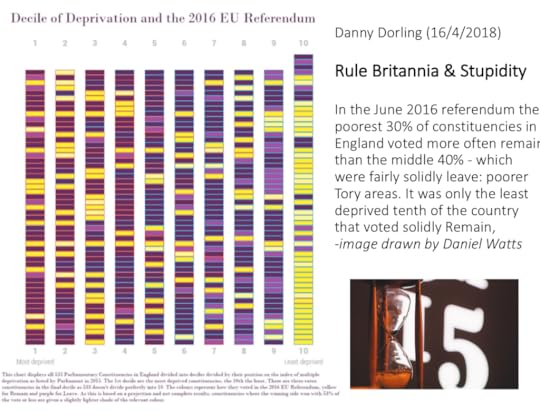
Decile of Deprivation and the 2106 EU Referendum
Richer Tories might be nasty, and often racist, but they are not stupid. They know what they are doing. Those who supported Leave knew what they were doing, as did those who said they supported Remain but still wanted people to believe that they hated immigration.
Våken is Norwegian for ‘alert’ or ‘awake’. On 22 July 2011, the Norwegian, Anders Breivik, who suffered from a narcissistic personality disorder, killed 77 people, most of them children, in a far-right attack associated with his fears – over immigration.
In ‘Operation Vaken’, in 2013, the UK Home Office placed adverts about immigration in many shop windows in areas where higher than average numbers of people were not white and not Christian.
As part of ‘Operation Vaken’ the Home Office paid for adverts to be included in eight British newspapers that were sold in higher numbers to members of ethnic minorities living in Britain.
The Home Office had postcards, leaflets and posters especially printed to be put up in buildings used by minority faith and charity groups; and the Home Office paid for vans to drive around London carrying huge billboards.
It is five year ago now, but you may still remember the vans and the words:
‘In the UK illegally? 106 arrests last week in your area. Go Home or Face arrest’.
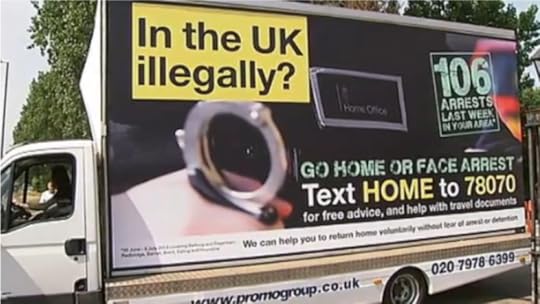
‘Operation Vaken’, 2013, the UK Home Office
The campaign was seen as so illiberal it was even criticised by Nigel Farage. The campaign was ordered by the then Home secretary, Theresa May. It was nasty, vicious and racist.
It was prejudice against people of other races, it pandered to the desires of those who believed that a particular race is superior to another.
The real audience of the advertisements was not just the people who were terrorised directly by their words; or those made to feel inferior because it was their areas that were being singled out.
The largest section by far of the intended audience for those advertisement, the vast majority of people who would eventually see them when printed in the news stories in the tabloids and on their TV screens were poorer potential and actual Tory voters in middle England.
Operation Vaken was as much (if not much more) about stoking up the fears and desires of white middle class middle England than about anything else. And it was part of a decades long campaign to blame immigration for the decline of Britain from its imperial glory.
Most chillingly the advertisements pictured a pair of hand-cuffs. [Remember Pero’s Bridge?]
Remarkably, the Advertising Standards Agency, while banning the 2013 adverts for including misleading statistics, said that they were ‘unlikely to cause serious or widespread offence or distress.’
On 13 July 2017 Rhodri Philipps, Viscount St Davids, supposedly a descendent of Richard the Lionheart, was jailed for racially abusing Gina Miller, the business woman who won a legal challenge over insisting there be a parliamentary vote after article 50 was ‘triggered’.
Rhodri had described her as “a boat jumper’’ and he went on to say: “if this is what we expect of immigrants; send them back to their stinking jungles”. He, like so many of the elite, is stuck with an imperial mentality. Rhodri was the offspring of a British Viscount who married Augusta Victoria Correa y Larraín, from Chile.
Someone, possibly someone in Rhodri’s family, is obsessed with genes and where they originate from. According to the website geni.com, sometime after 1565 a man called Antonio Faustino Correa de Acosta was born in Portugal.
In 1630 [possibly at the age of 65?!], in Spain, he fathered a boy named Antonio Correa López Acosta who in 1673 in Lima (Peru) became the father of Cayetano Esteban Correa Padilla Sande.
In 1703 in Vichuquén (Chile) Cayetano’s son Manuel Gregorio Correa Oyarzún was born. In turn Manuel became the father of Manuel Gregorio Correa Fuenzalida in Curicó (Chile) in 1753. This second Manuel then fathered Bonifacio Correa Corbalán Castilla in 1785. In 1838, Bonifacio had a son in Santiago in Chile: José Gregorio Correa Albano; who in turn in 1864 fathered Pedro Correa Ovalle, who had a son called (Don) Estanislao Correa Ugarte who then had a daughter in Santiago, Augusta Victoria Correa y Larraín, later Viscountess St. Davids when (on 7 December 1965) she married the then Viscount and on 16th September 1966 in Britain she had a son called Rhodri, who later went to gaol, for being a racist.
She is almost certainly his mother, but what do you think the chances are that every single one of these men was really the father of each of their sons without exception?
Some people have a perverse obsession with their genes, with where they are from, of what special ‘stock’ they may be made of, and hence why they and theirs should rule – Britannia.
Early on in her ill-fated party conference speech in October 2017, before the writing began to fall off the wall, before her voice went, before the protestor rushed up to her, Prime Minster Theresa May mentioned that her grandmother ‘…boasts three professors and a prime minister’ among her offspring. It is worth pondering why Theresa thought that fact was so important?
What does drive Mrs May and what does she really believe about herself and about the rest of us? After all, when it comes to Brexit, Britannia, and where next this stupidity will take us, we are now – for a short time – in her hands.
She, and the rest of us, are about to learn that our woes were not caused by immigrants in the 1990s, just as they were not caused by the trade unions in the 1970s, or by the socialists in the 1960s, or by every other group that has even been singled out for why Britannia no longer rules the waves.
We have a lot of learning to do. A lot more than we presumed two years ago. One of the fastest ways to learn is not just to think about the alternative, but to live it. And we, in Britain are about to live the alternative – so who will we blame next when we are not soon great again?
Thee haughty tyrants ne’er shall tame;
All their attempts to bend thee down
Will but arouse thy generous flame,
But work their woe and thy renown.
To thee belongs the rural reign;
Thy cities shall with commerce shine;
All thine shall be the subject main,
And every shore it circles, thine.
The Muses, still with freedom found,
Shall to thy happy coasts repair.
Blest isle! with matchless beauty crowned,
And manly hearts to guard the fair.
Rule, Britannia! Britannia, rule the waves!
Britons never, never, never shall be slaves
April 12, 2018
Syria, the West’s Response and International Law
Syria, the west’s response and international law, Letter, Wednesday 11th April 2018: “Readers including Mark Rylance, Brian Eno and Francesca Martinez respond to the escalating situation in Syria”.
There can be no justification for chemical weapon attacks, or for despicable bombing that targets civilians of the sort that we saw in Douma. Further military intervention, as proposed by Trump, May or Macron, is not the solution and can only extend the appalling suffering of the people of Syria. It also risks spreading the war across the Middle East and raises the frightening possibility of direct confrontation between nuclear-armed powers.
It is quite wrong to argue, as Tony Blair does, that these attacks are the price of non-intervention. Foreign military intervention from all sides, including from the UK government, has only served to deepen and prolong the war in Syria. Britain voted to join the US in bombing Syria in 2015 and was involved in covert operations before that. Its interventions have killed many people, fuelled the cycle of violence and done nothing to bring peace.
Rather than backing the gung-ho foreign policy of the most inflammatory and xenophobic US president in history, the UK government should be seeking political and diplomatic solutions to the tragic situation in Syria, and to avoid anything that can escalate further the conflict in the region.
Mark Rylance,
Brian Eno,
Francesca Martinez,
Owen Jones,
Lindsey German,
Murad Qureshi,
Chris Williamson MP,
Emma Dent Coad MP,
Ian Mearns MP,
George Monbiot,
Giles Fraser,
Harry Leslie Smith,
Victoria Brittain,
Andrew Murray,
Kevin Courtney,
Manuel Cortes,
Kate Hudson,
Kiri Tunks,
Alex Kenny,
Alexei Sayle,
Kareem Dennis,
Gerald Simpson,
Lara McNeill,
Marcus Barnett,
Shelly Asquith,
Robin Brookes,
Professor Alfredo Saad Filho,
Professor Diane Reay,
Professor Danny Dorling,
Professor Des Freedman,
Professor David Miller,
Professor Peter Hallward,
Dr Feyzi Ismail,
Dr Kalpana Wilson,
Dr Gholam Khiabany,
Dr Tassia Kobylinska,
Dr Milly Williamson
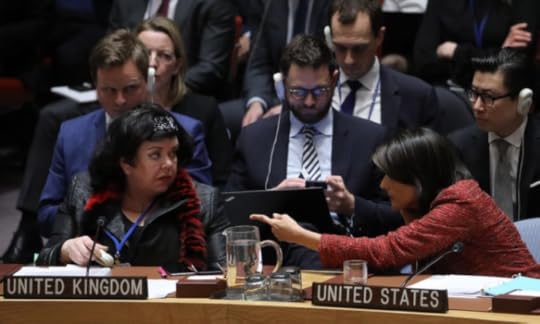
US ambassador to the UN and Karen Pierce, UK ambassador to the UN, during a security council meeting on 10 April 2018 on suspected chemical attacks in Douma, Syria.
March 30, 2018
Review of Branco Milanovic’s Global Inequality: A new approach for the Age of Globalization
The first words on the inside cover of this book announce that it has been written by one of the world’s leading economists. Part of rising inequality is an unwarranted, and usually unquestioning, acceptance that just a few people are leading and many others simply have to follow, lapping up the trickle down of their great thinking.
Milanovic’s big claim in this book is that he has introduced a new concept: Kuznets waves. These ‘can not only satisfactorily explain the most recent spell of increasing inequality but can also be used to predict inequality’s future course in rich countries like the United States or in middle-income countries like China and Brazil‘.
Milanovic is not bashful. He thinks he has found a way to foretell the future. Without irony, he has named his new theory after Simon Kuznets, the economist who half a century ago gave his name to a curve. The Kuznets curve predicted that with industrialisation inequality in a society at first rises, then it reaches a peak and then, apparently and theoretically, it falls as long as market forces are allowed to run freely.
All this is because initially there would be more and more greed and exploitation, but later some form of trickle down would begin to operate. The reality, of course, is that in the country that Kuznets studied the most, the USA, what actually occurred was the very opposite of this. But in 1971, before that became apparent, Kuznets was awarded the equivalent of the Nobel prize in economics.
In the decades that followed it became clear that the Kuznets’ curve theory was wrong. Inequality in the USA rose and rose, partly because economists carried on talking about the Kuznets curves, rather than doing something more useful.
At one point in this book the author makes an excursion (Excursus 1.3) to discuss how a particular number, one billion, differs from another number, one million. The book is either not aimed at a very able audience, or its writer believes that it shows some great insight to be able to explain that ‘To transport $1 million in $100 bills requires a medium-sized briefcase. To ferry $1 billion in the same banknotes would require a thousand such briefcases’. If you find such insights illuminating, then this is the book for you.
Before explaining why the new theory of Kuznets waves is not convincing I should say that this book does do a fairly good job of describing the basic global distribution of income inequality and how it has been changing very recently. It also lists a series of interesting historical events that were connected to changes in income and wage inequalities, such as the plague and, much later, world wars. But why does the author then feel obliged to try to define a new economic theory; one that he claims will successfully predict the future?
Read more as published in the Journal of Critical Social Policy and reviewed by Danny Dorling.
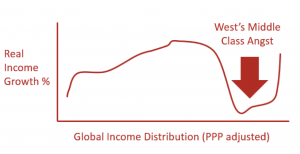
The changing distribution of income worldwide as described by Branco Milanovic
March 25, 2018
Why we need an anti-war government
We know they used to keep plans for war secret from us. We know just how wrong they were in the past. So what are we not being told today?
In the 1950s in Britain, shortly after the Second World War, a nuclear bunker was built roughly every eight miles in every direction in this country. These bunkers were about four or five metres down, three people could sleep in them.
You can go to the Cotswolds now, you go to Broadway, go up to the tower there, ask them nicely in the tower and they will give you a guided tour of the nuclear bunker in Broadway. And in that nuclear bunker the local Sub-Post Officer and volunteers would go in to practise what to do in the event of a nuclear war.
They would go down – three of them into the bunker – and ‘man’ a periscope, looking in all directions, so that they could radio through and say where the Mushroom Cloud was and its size. And, of course, this was all covered by the Official Secrets Act. The base to which they were going to radio into was probably in Oxford. I don’t yet know where the big bunker in Oxford was, I would quite like to know its location.
A man (who in the 1990s as a young man was part of the staff) can take you down and show you round, quite patriotically. Those who staffed the bunker weren’t paid, except in food.
The bunkers continuously received food because government never knew when that food might be needed and food goes off. The volunteers used to take the food and eat it at home.
The food was there for when the warning came and you had to go and sit in the bunker, not coming out for two weeks while you hoped war would not start. Harold Wilson (when he was Prime Minister) cut the number of bunkers in half, quietly.
It was all secret.
So nobody other than the largely unquestioning specially selected ‘volunteers’, the military, and a few politicians, ever got to know. Finally, in 1992, they stopped using them entirely, but it was all still an official, absolute, secret.
The reason they stopped using the bunkers in 1992 was that the government had worked out, then, that there was no way that we were going to survive a nuclear war. But until 1992 they thought we were. They had to wait till Margaret Thatcher was forced out of power because she would never admit that we couldn’t survive.
Listen to the full speech, given in Oxford Town Hall on Thursday 22nd of March 2018:
Slowly the story is being told to the public. In the Yorkshire Evening Post newspaper on March 23rd 2018 people were told, for the first time, the following information. So please read the following summary from that news story and think: What are they planing and doing today that they are not telling you about?
“Contrary to popular belief, there were no public shelters built to withstand nuclear war – it would simply not have been possible to provide enough for the civilian population. Instead, bunkers were constructed in major cities to hold a select group of government and local authority staff who would run what remained of the country from these underground nerve centres.
None of the staff would have been allowed to take family members into the shelter with them – if they refused to go to their post, they were subject to martial law enforced by the regional commander, who had the power to order summary executions for a range of offences.
Despite costing around £1million each to build, this first wave of shelters quickly became obsolete as bomb technology became more powerful. The first War Rooms would have been inadequate in the event of a hydrogen bomb strike, and too small for the number of staff that would be needed in a devastating attack. A new network of larger bunkers called Regional Government Headquarters were built instead, and the Leeds bunker was downgraded in status beneath that of the regional nerve centre at Shipton, near York.
Leeds City Council took over the bunker as a local control centre in 1968 and it was in use until 1981, although only the upper level was occupied. It was decommissioned in the 1990s but was one of the final four of the original 13 to remain standing.
It passed into the ownership of a property company and was demolished in 2015, when the site was cleared for housing development. Our reporter was allowed access in 2011.”
But that story was only told this year to people living in Yorkshire. Slowly, drip by drip, in local news stories, we are told about past secrets and learn just how wrong those in power have been in our lifetimes. Why do you think they know any better today? What will be revealed in future about how our current government had secret plans for war? What is being done right now that in future will be revealed as both futile and very dangerous?

“ROYAL OBSERVER CORPS
Underground Monitoring Post Locations” http://www.roc-heritage.co.uk/posts-m...

Mushroom cloud above Nagasaki after atomic bombing on August 9, 1945.
March 23, 2018
The Demography of Inequality
Re: Rise in mortality in England and Wales in first seven weeks of 2018: Rapid response by Lu Hiam and Danny Dorling, published in the British Medical Journal, March 23rd 2018
On 20th March 2018, speaking in the House of Commons, Dr Paul Williams MP referred to this editorial. He asked the Secretary of State for Health and Social Care, Jeremy Hunt, ‘why did all these extra deaths occur?’. Mr Hunt replied:
As the hon. Gentleman will know, these figures cover England and Wales. He will also know that they do not take account of changes in population or changes in demography, so we use the age-standardised mortality rate, which, according to Public Health England, has remained broadly stable over recent years.
To take each point in turn, firstly, the Secretary of State is correct: these figures do cover England and Wales. However, this distinction is trivial. If the figures for weekly provisional deaths by ‘region of usual residence’ are used, the total for Wales is 5,841 for weeks 1-7 of 2018, and the average for the last 5 years 5166. England deaths, therefore, are 88,149 compared to a 5-year average, without Wales, of 78,449. This gives an extra 9,700 deaths in England. These Office for National Statistics (ONS) data are available to the Secretary of State and his advisors if they wish to know about trends solely in England.
Secondly, a change in population or demography does not happen suddenly. However, we agree it would be useful to examine the age-standardised mortality rate. Given the gravity of the concerns raised, we hope Public Health England will urgently calculate this, using the ONS projection of the population at risk in 2018, to compare what was expected in 2018 to what has been seen. We do not believe this will alleviate our concerns. The ONS projections do not include a sudden very large influx of elderly people, and there is no evidence that this has occurred.
Finally, last week saw publication of statistics not only raising the alarm at mortality rates in adults, but also in infants. Infant mortality has risen two years in a row. This confirmed the concerns first raised by Taylor-Robinson et al in 2017, and re-iterated in their rapid response. Among countries of the European Union, between 1990 and 2015 the UK dropped from 7th place to 19th for neonatal mortality, and from 9th to 19th for under-five mortality.
Infant mortality is rising, life expectancy is stalling, and there have already been 9,700 extra deaths above what is usual in England in the first 7 weeks of 2018. This leaves us wondering—what will it take for the Government to investigate? We hope the Secretary of State for Health will significantly and urgently re-consider his response.
The full rapid response and be read here along with the editorial it refers to, and discussion of issues recorded the day before is in the podcast below.

Bodleian Quad, Oxford
March 22, 2018
Recent deaths in prisons and for people in mental health detention in the UK
Decent rights, trust, and fairness all require greater economic equality. Without greater economic equality we cannot expect people to trust each other; rights to be upheld, maintained or respected; or for fairness to be preserved.
There is an un-egalitarian fantasy that it is possible to continue with great economic inequalities, but somehow for people to know their place and behave well in it. That fantasy has, unfortunately, become current government policy. So who should be held to account when official policies result in mortality rates rising: within mental health institutions most recently, prisons generally, and society more widely?
In the UK the situation has recently worsened. According to an editorial published in The Lancet on 10th March 2018:‘In 2016, the likelihood of self-inflicted death of offenders in custody was 8.6 times greater than the likelihood of suicide in the general population… It is lamentable that the UK’s prison system should have been allowed to decline to its current unsatisfactory levels, bringing with it a rise in depression and suicide as prisoners find themselves part of a system that puts containment above reform.‘
The editorial continued: ‘As with so much of the discussion around public services in the UK, the sense that a tipping point will soon be reached is tangible. The UK’s prison system has shed 30% of staff since austerity began in 2010. The average amount spent on suicide investigations in UK prisons has more than halved since 2012–13. Until conditions are improved, guidelines like these are a firefighting effort in a situation where the fires themselves may be preventable.’
Two years ago on 23rd September 2016, Richard Garside reported that the prison population had risen from 46,000 in 1985 to 85,000. He explained that earlier that month the Prisons and Probation Ombudsman, Nigel Newcomen, had reported that prison violence was now at a ‘wholly unacceptable level’ [but we accepted it]. Six prisoners were killed in the 2015-16 year, he observed. This is up from four in 2014-15 and that was the highest number since records began in 2000. ‘Buildings are crumbling, infested with rats and cockroaches‘, The Economist noted in 2016. ‘In the year to June 2015,’ it pointed out, ‘105 prisoners killed themselves, compared with 59 in 2010‘. And that has now also worsened.
By May 2017 we learnt that ‘Deaths in state detention (excluding Deprivation of Liberty orders) increased by 19%, to 574 deaths being reported to coroners in 2016, with the largest increase seen in deaths while detained under the Mental Health Act (252 in 2016, up 34%) and deaths in prison custody (298, up 14%).’ Numbers of annual deaths of people held under the Mental Health Act are now almost as high as those in prisons and the population detained is roughly half as many people.
Today, in 2018, across the UK, twice as many detained patients die, per 1000, as prisoners die in prison in the UK, and the number dying in prisons has risen greatly. The overall situation is worsening.
A quarter of million British children currently have a parent in prison. One in seven children have had a parent in prison at some point but nobody talks about it, and nobody knows how many children, parents and siblings have a parent, child, brother or sister in a mental health institution. All of whom are now at greater risk than they were a few years ago. We only know this because the numbers of deaths in custody have recently been rising more quickly than the number of people deprived of their liberty.
In 2017, prisons were using ‘cruel‘ punishments that restricted inmates from seeing their children. Hundreds of children had contact with fathers reduced to just two hours a month.
As David Scott explained on January 10th 2018:’We’ve been trying to reform the prison for 200 years. It’s failed. It’s time for us to think about doing something different‘.
A society that has learnt to tolerate some people being worth so much more than others, with such high income inequality, will then tolerate so many other injustices.
Danny Dorling's Blog
- Danny Dorling's profile
- 96 followers



